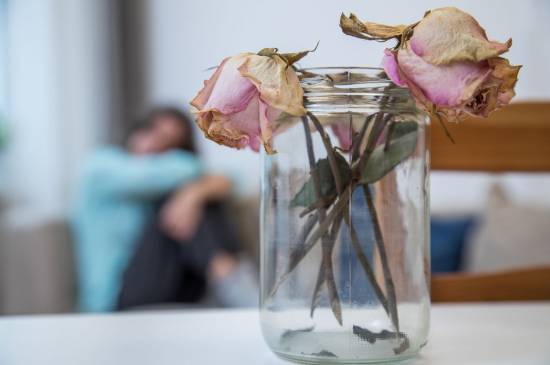Age-related illnesses, the deaths of friends and family members and loneliness are among several factors that make depression common for older people, especially for those who had mental health problems earlier in life. Experts say there are clear steps family members should take.
A pall falls over your life and you ask yourself, "What's the point of going on?" Where once there was joy is now only emptiness.
Depression is a common mental disorder that affects an estimated 5% of adults globally, according to the World Health Organization (WHO), saying it's "a leading cause of disability around the world and contributes greatly to the global burden of disease."
Many of those affected are older people, who have to contend with age-related illnesses, the deaths of friends and family members, and often loneliness. Considering these common scourges of old age, it's easy to assume that depression occurs more frequently in the elderly than in younger people. But this isn't so.
"Depression isn't so much a reaction to difficult personal circumstances as it is an independent illness," says Ulrich Hegerl, professor of psychiatry and psychotherapy at the University of Frankfurt in Germany and chairperson of the German Depression Aid Foundation.
Most older people suffering from the mental disorder had depressive phases earlier in their life, notes Hegerl. But depression later in life is different in some ways.
"Your troubles aren't the same as they were in your youth or middle age," says Armin Rosl, vice chairperson of the German Depression League (DDL), which helps people with depression and their family members. Loneliness, for example, is a big problem, points out Rosl, who has suffered from depression himself and heads a support group.
While depression doesn't occur more frequently in old age, it's definitely more dangerous then, according to Hegerl. "There's an increased risk of suicide – exceedingly so – especially for men," he says.
And not getting out of bed for days, a lack of physical activity and not drinking enough fluids can be life-threatening. One possible consequence is thrombosis.
What should family members watch for in a loved one to head off the development of full-blown depression? Among the possible warning signs is extreme withdrawal, not responding to phone calls and revealing little about themselves. They may also lack the motivation to take care of their appearance, bath and get dressed.
Pronounced cheerlessness is typical as well. If their mood were a piece of music, it would be "in a minor key," remarks Rosl; they're usually quiet and "what they say is streaked with sadness."
What can family members and friends do then? They should definitely speak to the person about it, the experts advise, hard though it may be sometimes to find the right words. "It's better to check with them too often than too seldom," Rosl says.
The first place to turn is the person's GP surgery, where they can be referred to a psychiatrist or psychotherapist. To provide support, family members can offer to accompany them to their appointments.
Particularly if it's the first time the person has displayed depressive symptoms in old age, the doctor should start by evaluating whether any underlying medical conditions could be the cause, Rösl says.
It should also be asked: Does he or she have a circulatory or immunological disorder, or perhaps chronic fatigue syndrome?
To answer questions like these, a close look must be taken at test results and brain structures. And sometimes Alzheimer's disease or other forms of dementia are mistaken for depression.
Although it's not curable in a conventional sense, depression can be effectively treated – often with a combination of medication and psychotherapy.
When an antidepressant is prescribed, care must be taken in selecting the one that's right for the patient. "Many older people have other illnesses for which they take medications, which can result in drug interactions," warns Hegerl.
In addition to medication and psychotherapy, there are things depression sufferers can – and should – do on their own to help themselves. "Simply swallowing medicine and waiting until [the depression] goes away doesn't work," Rösl says.
Taking time for a daily walk, for instance, can help older people with depression. "Or you could attend a church service once or twice a week," he suggests. Regularly taking part in activities at a senior center is another possibility.
Family members need to understand the nature of their loved one's illness. It's often difficult for them to grasp at first that the person can no longer do even the simplest things, notes Hegerl, "but it's not on purpose or due to self-neglect."
It's also important that family members don't blame themselves for the illness, and that they understand they're not responsible for restoring the person to sound mental health. "Depression can't be remedied by love alone any more than appendicitis can," Hegerl says./DPA


